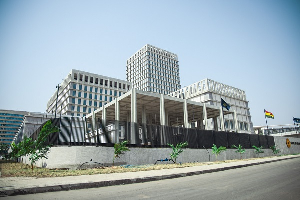Accra, May 26, GNA - ABANTU for Development, a Non-Governmental Organisation on Wednesday called on government to ensure that achieving equity in access to and control of land becomes an integral component of the Land Administration Project (LAP).
It also called for the LAP to be reviewed by the end of next year to promote the tenure security of social groups such as women and tenants.
Other demands included the recognition and compensation of women's contribution to farm development at divorce and on death of their spouses and that measures be put in place by the end of 2005 to ensure that land registration; and titling processes promotes joint registration of conjugal family farmlands, to enhance women's tenure security.
Dr. Dzodzi Tsikata, a Senior Research Fellow at the Institute of Statistics, Social and Economic Research (ISSER), University of Ghana, made the call at a Press conference to give an update on the women's manifesto, a review project undertaken by ABANTU in collaboration with the Friedrich Ebert Foundation (FES) to highlight issues on Women and Land.
Dr. Tsikata said, to improve the situation of women, a fundamental transformation in customary tenure systems and land administration practices that goes beyond the LAP was necessary. She said there was no doubt that women form about 52 per cent of the agricultural labour force and produce about 70 per cent of subsistence crops yet they do not have control over land and their interests were becoming more and more insecure in the growing face of land insecurities.
She stated that women's lack of full land rights affects their access to other resources such as their economic, social and political status, adding that given the importance of land, it was critical that there was equity in access to and control of land to enable them to gain proper recognition for expansion.
She said though Article 35 section one of the constitution had provisions that protects women's land rights, the land tenure and administration systems in Ghana faces serious problems, which undermine these constitutional guarantees.
Dr. Tsikata noted that as female members and wives, women experience a discriminatory customary practice that sometimes limits their interests to family land by marital residence.
"Marriage is probably the most important source of farming land for women and a wife's duty to work on her husbands farm affects her attempts at farming for herself for economic gains", she said. She further stated that though marriage provides women with some level of land security, in situations of marital conflicts or divorce, the insecurity of a wife's interest in a land belonging to her husband becomes quiet clear and "this is because customary law does not recognise marital property or non-monetary contributions to the acquisition of property during marriage".
"Even though widows might benefit from their children's inheritance, the fact that they cannot inherit their husbands increases their social vulnerability and poverty", he said
Dr. Tsikata urged family heads to consider the land rights of women when it got to sharing family lands, so that they could also become proud administrators to enhance their status in society.
Regional News of Wednesday, 26 May 2004
Source: GNA
















